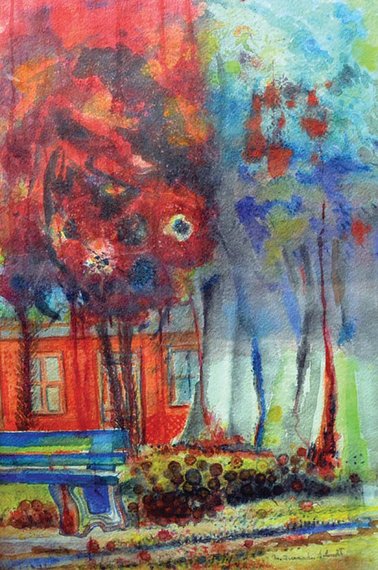Just after dawn, we get up,
without coffee, and let the dog lead us
through a grove of wind-stunted trees,
spiked succulents, red-berried holly,
and over the dune ridge out of the gray
of still sleeping minds.

Margarita Quesada Schmidt, Arbol Rojo (1994)
On his fourth and final voyage to the New World in 1502, Christopher Columbus discovered the most luscious, biologically diverse land, populated by hospitable, generous natives adorned in jade and gold. He sped back to Spain to report that he had found paradise in this costa rica, 'rich coast.'
But the Spanish conquistadores who followed would find the term a bitter misnomer. The natives were averse to being colonized, the gold nowhere to be found. Costa Rica was, ironically, "the poorest and most miserable Spanish colony in all America."
A line of pink
from the not yet risen sun
reminds me of the lilac shadows
caught in the radial grooves of shells.
Centuries and colonizers have come and gone, but hopeful men today still undertake Columbus's journey in search of a better life. Scouring the planet, gazing at stars, covering vast expanses of land and sea, digging mines. Deciphering ancient texts, debating philosophies, even braving death, to find paradise on the other side.
I take up your hand and feel the blood
warming your fingers, as the dog bounds off
dragging her leash through wet sand.
On these journeys many lives undertake, some may pass through, others just by, an unremarkable little town. In it there are church bells, coffee plantations, organic farms. A public garden containing six hundred species of orchids, flower markets and flower shops. Clay-colored thrushes and blue-tailed hummingbirds, thousands of butterflies. Dogs nobody owns but everybody feeds, napping in the shade, casually crossing the streets.
The people of this town are unremarkable too. They live in one room huts on small plots of land, and plant flowers on their windowsills, in their wheelbarrows, on their roofs. The men pluck bright red coffee and straw berries, the children pick bananas from trees. They proudly display their harvest in woven baskets on the porch. Meanwhile, at the kitchen table inside, the women serve heaping portions of cassadas, three dollars a plate.
This town is called Paraíso. Paradise.
Margarita Quesada Schmidt was born in this place most would dream of leaving, to a life most would dream of changing. She taught elementary school for twenty years, retired at the conventional age of sixty-four, and took a seat by the window. Looking out onto the daily happenings of her town, she imagined landscapes, traditional scenes, dreams vibrant with "intense colors, highly luminous contrasts." And she began to paint.
She's after gulls and a line of waves
that repeat themselves, she seems to think,
because they want to play.
A bicycle on a park corner. Wildflowers, freshly picked. A stack of books and handwritten notes, discarded on a pale green bench. White coffee blossoms, falling off a tree. She made drawings, oil paintings, and watercolors of a world she saw from her window, of little, unremarkable things. Not life, but what she made of it. Not reality, but hers.
La pura vida is an ideology that encapsulates a calm, uncluttered appreciation of life. It is finding paradise in simple things. A single ray of sunlight through white cotton curtains. The first sip of just ground coffee. The pink hue of a new day.
A morning breeze
stirs the now turning tide, breathing over it,
sighing toward bayside.
As the waves come in
whorls of light unfold on the sand.
Paraíso is a town you pass, on your way to paradise. Small and easy to miss, nestled in a gentle hill, dipping into warm coastal sand. No economy or industry to speak of, but such a soft name; the 'r' pours over like golden coffee liquor, the 'a's loop freely like a carrousel song.
If you ever do find yourself in that unremarkable town, knock on one of the old wooden doors, accept the invitation to come in. Take a seat at the table; there is always one to spare. Have a slice of queso palmito on pineapple or bread. And then a few strawberries. No one eats alone in the town of Paraíso. There is always enough to share.
How I want
for us to repeat ourselves, on and on,
you holding the leash of a silly dog, me
feeling the beat, the blood in your hand.
- David Salner, "A Dog by the Sea"
Sweet juice runs messily down your chin. Out the window, you glimpse pure life. Perhaps in the morning, you will go on your way again, to find paradise. Perhaps tonight, you already have.
This post was originally published here, on the author's blog: Aristotle at Afternoon Tea.